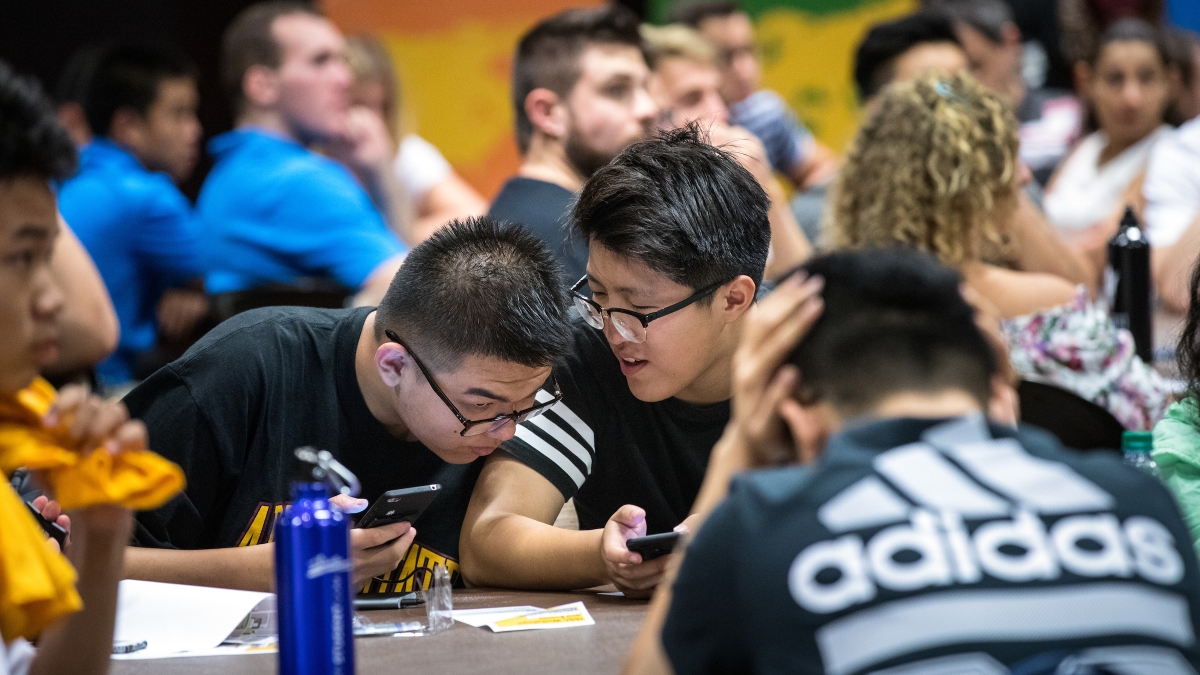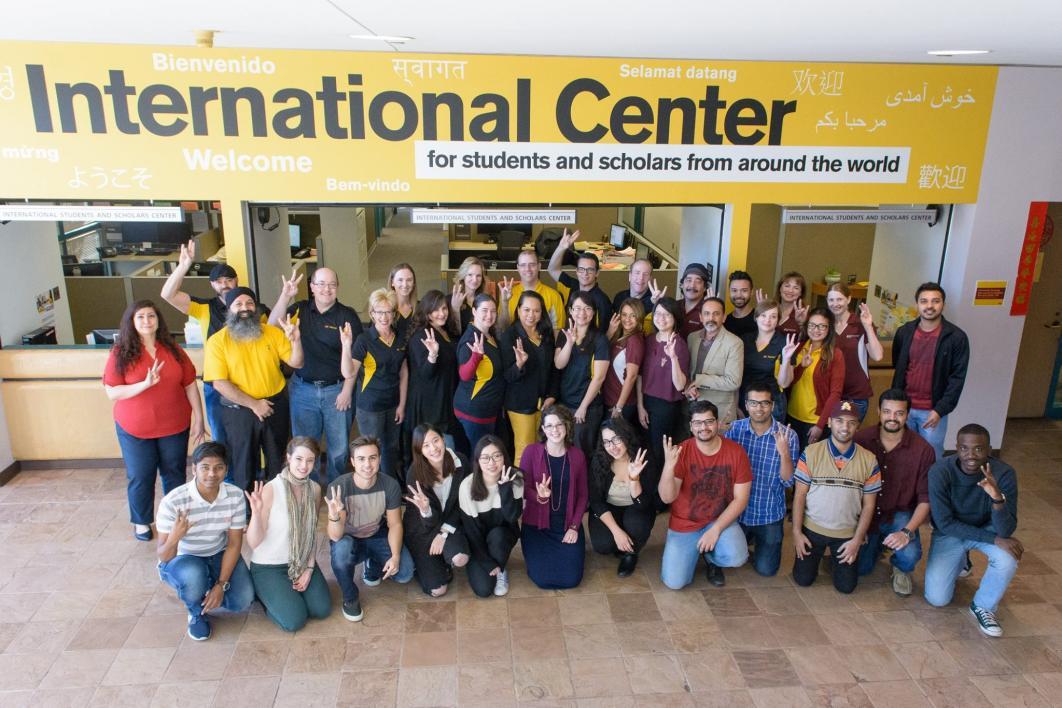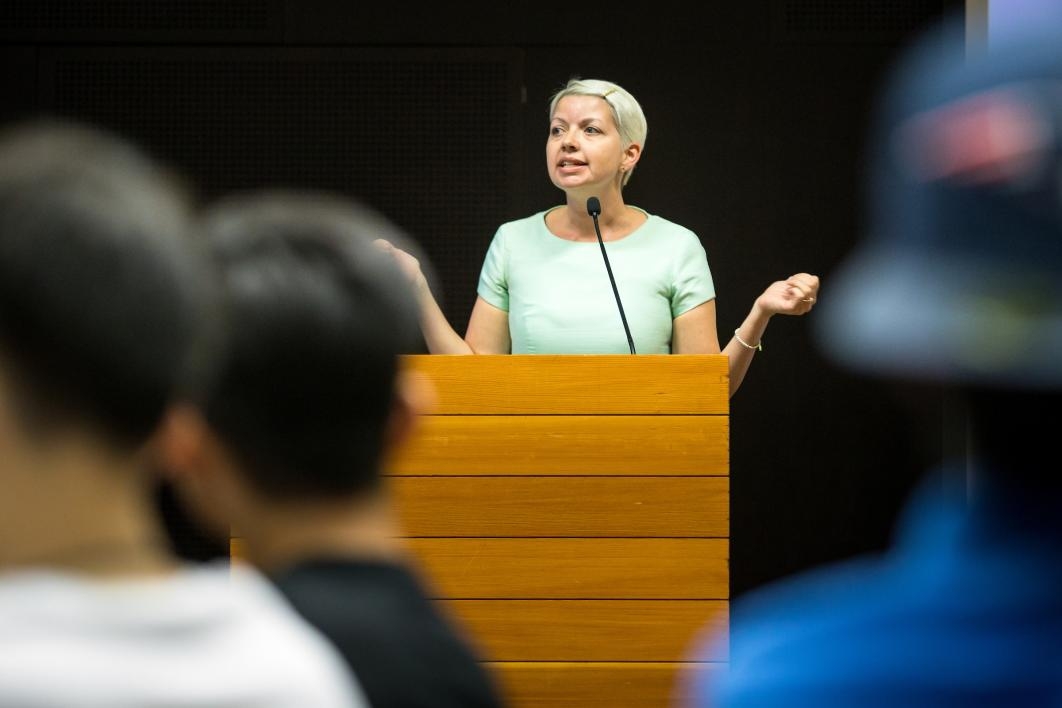Every year, thousands of young people leave their home countries and travel thousands of miles to seek degrees at Arizona State University, where it's both exciting and overwhelming dealing with a different language, a new academic system, making friends and the scorching heat.
They need help in their journey. So in recent years, ASU has expanded its services for international scholars.
“It’s not hodgepodge or scattershot, and not just, ‘We’ll give them English and culture,’” said Bob Schoenfeld, executive liaison for international student services in the W. P. Carey School of Business.
“Now we choose what is valuable, what will make them successful, and then we design workshops and get feedback from faculty and staff and the students themselves.”
This fall, ASU is hosting 12,500 international students, with China and India sending the most young adults here. Graduate students and undergraduates get a full week of orientation, where they learn about all the services available to them — social clubs, conversation groups, tutoring, legal information, grammar sessions and tips on how to attend a football game. They find out what’s expected in an American classroom and how to ask for help.
As the world changes, ASU’s strategy has evolved, with university leaders traveling abroad to welcome students in their home countries.
“Things that were obvious before, we now have to spread the word. Some international students think that things have changed in six months’ time but they have not,” said Holly Singh, senior director of the International Students and Scholars Center at ASU.
Singh went to six cities in India last spring with a team from the Ira A. Fulton Schools of Engineering to answer questions from students who had already been admitted into graduate programs at ASU but were uncertain about accepting their offers.
“First we told them, ‘We are still a welcoming community.’ That hasn’t changed,” Singh said.
The ASU team reassured the Indian students about opportunities to work here for a few years after they earn their degrees.
“Startups and venture capitalists are still looking for talent,” Singh said.
Creating a safety net
The Sun Devil welcome begins at the airport, where international students are greeted by an ASU team and given free transportation to whichever campus they’re attending.
Many come with their families, and ASU’s weeklong orientation includes information for parents, Singh said. The orientation is meant to create a safety net for the international students with each other.
“Otherwise, they would stick with students from their own countries,” he said. “There’s comfort in speaking their own language.”
The ASU orientation staffers use ice breakers, information sessions and games to promote important concepts of American life, such as speaking up.
“American students have grown up in a culture where they are given the freedom to ask for things they need,” Singh said. “But many of the international students have the mindset, ‘I’m a guest in this country and I shouldn’t speak first.’
“We tell them, ‘If you need anything raise your hand. That’s the only way we’ll know. We’re your first contact but we won’t know if you’re sitting at home and can’t meet people.”
That’s what happened to Jiayi Lew, a junior environmental engineering major from Malaysia. He came a few days before the general move-in date and spent two entire days speaking to no one.
“It’s scary. You’re alone and there’s no one to talk to,” he said. Now starting his second year here, Lew said that when the students arrived, he found the Americans friendly and he quickly made friends. He is now the president of the Coalition of International Students, a group of 19 student organizations that helps visiting scholars with social and professional events.
When Lew arrived, he met another Malaysian student through Global Guides, a program that matches international students with peers to help with the transition, and now his guide has become his roommate.
He has especially enjoyed the classroom culture in America.
“I wanted the interactive style of teaching,” said Lew, who transferred from a small college in Malaysia. “There, the professors are like high school teachers. They lecture and we would just write it down.”
In many Asian countries, student participation is neither required nor expected, Schoenfeld said.
“Students coming from China don’t volunteer to speak because if they’re wrong, they lose face. We tell them that the classroom is a safe environment to ask questions and the professor expects it.”
Likewise, the students learn that in some countries, making eye contact is considered to be aggressive and rude, while in America it’s a sign of trustworthiness and respect.
“We have two versions of the workshop on academic integrity, because we want to transfer accountability from us to them and we say out loud, ‘This is so important, we’re talking about this twice.’ "
International students learn that after the begining of the semester, they can stay engaged with conversation groups, game nights and coffee chats. The Coalition for International Students holds several signature events, including a “Football 101” session and a “Glo-Ball.”
Schoenfeld especially likes to teach the foreign students about American idioms.
“This is where we teach nonacademic English,” he said. “I use a ‘Walking Dead’ episode to explain slang terms like ‘chick’ or ‘halfcocked.’ “
Easing culture shock
The first few weeks of the semester can be a blur of excitement and fun for international students, and their expectations are fueled by what they see in the media.
Kudret Muhammad, a freshman from the Xinjiang Uyghur Autonomous Region in China, arrived at ASU’s Lake Havasu campus a few weeks ago. He chose ASU over Yale University and the University of Pennsylvania after he won a national English contest in high school.
“I saw a video about ASU and the Lake Havasu campus, and the feeling was, ‘This is it. This is what I’ve been looking for,’ “ said Muhammad, a communications major. “It hasn’t been a month yet and I’m sure I will miss my family but at the same time I’m sure I’ll work hard to make myself and them proud."
Singh said that culture follows a pattern, and after the first few weeks, international students can face a rough patch.
“They begin to miss their families and their daily life,” Singh said. “Everything is annoying and different.”
Lew faced one of those terrifying moments when he was mystified in a new culture. Not long after arriving in Tempe, he went to a restaurant alone and noticed that other diners were leaving money on the table as they left.
“So I googled, ‘Why would people leave bank notes on a restaurant table?’ and I found out about tipping,” he said.
That initial inconvenience might typically pass, but a few months later, some international students can hit a deeper disorientation as they’re facing months away from home.
“Now they’re truly stuck in a different culture and it can clash with their sense of identity,” Singh said. “They’re adjusting at many different levels – emotionally, socially and academically.
“But when this is talked about in the first few days of arrival, when they see this depression coming, they can say, ‘oh, so this is what I’m experiencing.’”
Muneera Batool is a graduate student from Pakistan studying theater and interdisciplinary digital media on a Fulbright fellowship. She's already felt some pangs of homesickness in the three weeks she's been here.
“I just allow myself to feel it and it passes,” said Batool.
“But it's also very overwhelming. I'm constantly pushing myself and it feels like I have to do more work than I'm used to. There is an expectation but I also really want to excel and learn and have fun at the same time,” she said.
When the stress builds, all students can take advantage of the counseling services at ASU. Last spring, when the national political situation fueled uncertainty over travel and the status of international students, ASU Counseling Services stepped up to ease the anxiety by offering sessions that, as with all its services, took cultural needs into consideration.
“That often means leaving the office and going to where students are and providing support in ways different than what might be often thought of as the traditional approach, which is in the office, behind the door with one person,” said Aaron Krasnow, associate vice president and director of ASU Health and Counseling Services.
For example, the counseling center designed a workshop called, “The science and practice of stress management” at the request of a group of international students who were mostly science and math majors. It focused on what happens in the brain and body, what interventions are supported by science, and how to apply them.
“They said this approach felt consistent with both their academic and their cultural point of view and it still had all the material about what to do when you’re stressed out,” he said.
Finding the value
This year, for the first time, American students in the W. P. Carey School’s full-time master’s program also had international orientation.
“We have American students who are in a class with 30 percent of their classmates from China or India,” Schoenfeld said. “How do we communicate the value of that to them?”
The workshop included information on hiring trends.
“We help them see the benefits of a global community and how to communicate that to potential bosses. That’s an acquired skill that makes you a more attractive candidate.”
Schoenfeld, who’s worked with international students for several years, said that the best way for American students to help their counterparts is to cultivate empathy.
“Sympathy is, ‘I had the same experience so I understand.’ Empathy is, ‘I don’t have the same experience but I’ll try to understand.’
“Try to understand what it’s like to come here, 18 years old, and your English might not be perfect. But you’re trying to get a degree from the number one most innovative school in the country.”
For information on the International Students and Scholars Center, go here, and for ASU Global Guides, go here. Find out about ASU Counseling Services here.
Top photo: Accounting student Jinxue Chen (left) listens to marketing student Zuhao Wan, both from China, at the International Undergraduate Orientation earlier this month in the Memorial Union. More than 500 freshmen from 50 countries listened to speakers talk about American and ASU culture and how to flourish. Photo by Charlie Leight/ASU Now
More Business and entrepreneurship

New rankings show impact of ASU W. P. Carey School of Business
Good rankings for Arizona State University's W. P. Carey School of Business reinforces the school's commitments to access, excellence and innovation.This week, the Financial Times Business Education…

Arizona Business and Health Summit asks attendees to innovate for value
Arizona State University's W. P. Carey School of Business hosted the third annual Arizona Business and Health Summit, sponsored by the Arizona Biomedical Research Centre, on Thursday, Nov. 14, in…

An economic forecast with lots of variables
The prospect of a new presidential administration is prompting some discussions among top economists.Tariffs, immigration, possible deportation, tax cuts and reduced renewable energy credits are top…




